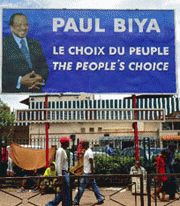 The October 9th presidential election in Cameroon has come and gone; Cameroonians continue to tend to their daily activities, hoping change will one day come to the Central African country. The election saw the anticipated victory of the incumbent President Paul Biya and the extension of his nearly thirty-year rule for seven more years, but high abstention rates signaled the indifference of both the local population and the first-time voting diaspora. This suggests the need for visible and quick measures by President Biya to gain his citizens’ confidence and appease an international community that promotes peaceful power alternation as a key to an effective democracy.
The October 9th presidential election in Cameroon has come and gone; Cameroonians continue to tend to their daily activities, hoping change will one day come to the Central African country. The election saw the anticipated victory of the incumbent President Paul Biya and the extension of his nearly thirty-year rule for seven more years, but high abstention rates signaled the indifference of both the local population and the first-time voting diaspora. This suggests the need for visible and quick measures by President Biya to gain his citizens’ confidence and appease an international community that promotes peaceful power alternation as a key to an effective democracy.
Key Conclusions
To ensure that sustainable peace and stability remain in Cameroon, President Biya, along with the ruling Cameroon People’s Democratic Movement (CPDM) and opposition party leaders, should draw critical lessons from the public political disengagement of most Cameroonians. Next year’s legislative and municipal elections will provide another opportunity for Cameroonian politicians to gauge the interest of the population.
In an international context increasingly hostile to long-serving rulers, President Biya is under scrutiny to deliver on his long-awaited promises of economic and social development and establish the democratic governance institutions outlined in the January 1996 constitution. Also, opposition political parties need greater credibility and better organization if they are to serve as any significant alternative to the ruling CPDM.
Analysis
Characterized by a local newspaper as the “triumph of abstention,” the October 2011 presidential election was the fourth one since multiparty presidential elections first began in 1992. It gave President Biya his sixth term in office since 1982, when he succeeded late Ahmadou Ahidjo, Cameroon’s first president since independence in 1960.
Until the mid-1980s, Cameroon was one of the most prosperous countries in Africa, with an average growth rate of 5 percent. A nation of 18 million inhabitants, Cameroon remains the commercial and economic leader in the subregion. It is the twelfth largest oil producer in Africa, despite decreasing production. It is also endowed with resources that include abundant forest reserves as well as substantial mineral and gas reserves.
However, after twenty-nine years of President Biya’s distant and autocratic rule, corruption and nepotism have negatively impacted the country’s development, and the latest economic performance is poorer than anticipated. In 2011, the growth rate was projected to be 3.8 percent. Poorly executed economic, governance and infrastructures projects; insufficient programs purported to help the 30 percent unemployment rate mainly among the 10 million youth; a powerless intellectual class vocal mostly abroad; and the vigorous watch of the anti-organized crime unit, Battalion of Rapid Intervention, an elite arm of the military often criticized for intimidating political opponents—these factors have gradually led to an apathetic society for which political participation constitutes a risky and futile business.
Of the over 7.5 million registered voters, 34.18 percent abstained from choosing among twenty-three candidates in an election won not by a majority, but by the person with the most votes (known as first-past-the-post voting). The twenty-two opposition candidates were each promised a 30 million CFA francs (over $62,000 USD) subvention from the state as financial assistance for the electoral campaign; an allowance unfortunately perceived by the public as a way for the government to divide the opposition, and reduce their chances for any substantial result. Also, the candidates’ visible weakness, disorganization, and the lack of political party manifestos further contributed to keep voters away from the polls. Having unsuccessfully challenged the election before the court, opposition parties called for mass protests against the flawed elections, a call largely ignored by the population.
In an international context increasingly hostile to long-serving rulers, Paul Biya’s term promises to be a winding path. The French government, traditionally a strong supporter, quickly shifted from acknowledging the “acceptable conditions” of the vote to aligning its position with that of the United States, which immediately criticized the numerous irregularities in Biya’s re-election. At the national level, President Biya’s dwindling legitimacy and monopoly of power are difficult to reconcile with the election propaganda image of him as a popular choice for peace and stability. Continuous mismanagement of public resources, combined with selective accountability, has the potential to erode Cameroonians’ patience sooner rather than later.
President Biya, now 78 years old, is under scrutiny to quickly deliver on long-awaited promises of economic and social development and to finally establish the institutions provided for in the January 1996 constitution. In that regard, realizing previously-announced economic and infrastructures projects, and completing the ongoing 25,000 youth recruitment program have the potential to accelerate the country’s development.
To succeed, the implementation of these projects and programs should be combined with a fight against corruption, whose tangible outcomes depend on an independent judiciary and speedy processes, and go beyond just the targeting of potential political rivals.
Moreover, strengthening democratic governance necessitates continuous opening of the political space to facilitate the emergence of a strong opposition, an active civil society, and more independent and locally-based political observers. The coming legislative and municipal elections in early 2012 will constitute another test for both the ruling CPDM and opposition parties to draw the necessary lessons from the recent electoral setback and offer credible and concrete alternatives to the Cameroonian people.
Photo credit: Africa Review




